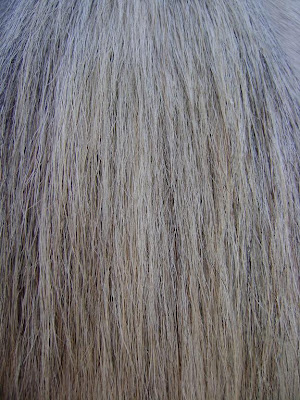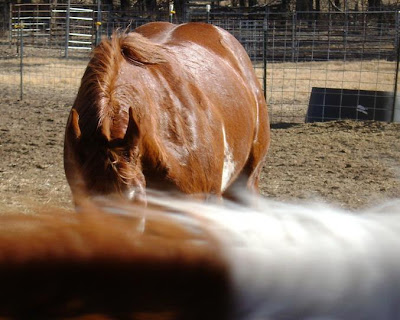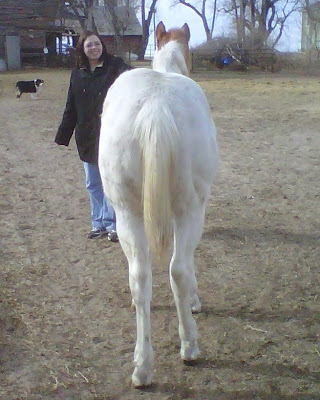
But Betty has led an isolated, albiet well-cared-for, life in a pasture with her momma. She is friendly and so very sweet, and she will allow me to put a halter on her (as long as I go slowly), but that's pretty much it. She's now two years old and technically not halter broke (because she doesn't lead). She is wary and lacks confidence and trust. So, I can see the situation either as a lost cause and we're starting so far behind that it will take so much to get caught up, or I can see her as a blank slate--an opportunity to train a horse that has absolutely no bad habits already formed. I choose to see her as the latter.
It is also a good opportunity to blog about our work. Now, I'm no horse trainer--I just play one on TV. Seriously, though, I've broke out a few horses of my own over the past nineteen years (good grief, that's a depressing statement) and I've worked as a show barn manager (aka "glorified groom) briefly, but I absolutely don't consider myself a trainer. In recording what work I do with Betty, I'm merely offering up a plate of raw ideas. You can take what suits your own tastes and cook them up yourself. I'll try to tell you if the peppers are especially sweet, or if the snow peas are past their prime, but in no way do I ever want to suggest that the way I do things is the "right way." As far as I'm concerned, the only right way is what works for that individual person with their individual horse.
That is my major complaint about most clinicians--they claim their way is the only way, and are sure to include that you must buy their "special" equipment, feed, DVD's, ropes, hats, clothing, and overpriced tickets to their events for you to succeed. They're just salesmen (and some are very good ones at that), so their followers fail to realize that what they preach isn't going to work in every situation. Soon the books and "special" sticks end up on Craigslist and the horse still sits idle, more confused than ever, with progress at a complete standstill because what the clinician said would work, didn't.
What has always made sense to me is to listen and read everything, from the top trainers to the everyday schmo, and then use what works best for you and your horse. I believe different methods work on different horses, because horses all have different personalities. I sacked out Paula in one day with one item before saddling her. With Fabian, I sacked him out with everything I could find, both with and without the saddle on. Fabian needed it, Paula didn't. Paula would have been bored to death if I had treated her the same as Fabian, and Fabian would have gotten me hurt if I had treated him the same as Paula. These are live animals, not automobiles. There is no Chilton's manual for horse training, and there never will be.
I used to love to work horses with my sister. Although we'd often get into fights (as teenaged siblings often do), we had the opportunity to bounce ideas off each other. If something didn't work, we'd come up with a plan to see what else we could try. No one taught us how to break out a horse, but by reading our horse magazines (before the internet), watching some VCR (yes, I'm old) tapes that mom had gotten us, and by just using our creativity, we broke out two ponies pretty well together. We'd talk about how best to take that next step with our young horses and draw upon what we'd learn between what we read and the lessons we had taken from various trainers. We'd not only train, but also learn, together.
I miss being able to bounce ideas about training back and forth with her. It seems since we've grown up and become adults, that we're all absolutely sure in our training methods and can't possibly need any help. Why would we talk about ideas when we have all the perfect solutions to every possible problem out there?
Of course, I'm being facetious here. But that's where we often gravitate to, even if it's not that extreme, isn't it? I know I catch myself doing it and I'm obviously not that unique.... I remember how much fun it was to try new things, and to explore possiblities with our horses. I say let's try to bring that back to the forefront. There are no solutions (horses aren't math problems, after all); there are just ideas.
So, in the spirit of a free and wide-ranging exchange of thoughts and ideas concerning horse training, over the coming months I will do my best to document Betty's training--the good, bad, and (hopefully minimal amount of) ugly. If you have any ideas I'd love to hear them as well! And of course, I love reading the blogs of those of you who make it a point to document your daily training exercises. There are tons of good ideas out there, and I, for one, appreciate that you take the time to outline your processes.
In any case, I will certainly make some mistakes, and hopefully have a few victories to share as well. This is a great opportunity to start at the beginning, and its a journey I look forward to sharing.
It's what you learn after you know it all that counts. ~Harry S. Truman



 It will be a lot like this one--same color and build. This one is a 24x12 shelter with a 6' tack room. The new building will be 12 x 18 without a tack room. It will go beside this one, about 20 feet away, and Dad and I will be installing continuous pipe fencing along the entire north side (and hopefully the front of the place as well). That will get me set up with a shelter for the "regular" horses and two stalls for the show horses and should tide me over pretty well until I can get a real barn built one day.
It will be a lot like this one--same color and build. This one is a 24x12 shelter with a 6' tack room. The new building will be 12 x 18 without a tack room. It will go beside this one, about 20 feet away, and Dad and I will be installing continuous pipe fencing along the entire north side (and hopefully the front of the place as well). That will get me set up with a shelter for the "regular" horses and two stalls for the show horses and should tide me over pretty well until I can get a real barn built one day.









 It's sort of funny but these two like to play really hard. They definitely have a love-hate thing going, like most siblings do.
It's sort of funny but these two like to play really hard. They definitely have a love-hate thing going, like most siblings do.











 "One morning I shot an elephant in my pajamas. How he got in my pajamas, I don't know." ~
"One morning I shot an elephant in my pajamas. How he got in my pajamas, I don't know." ~






 "I am big! It's the pictures that got small." ~
"I am big! It's the pictures that got small." ~ "I'm walking here! I'm walking here!" ~
"I'm walking here! I'm walking here!" ~
 "We rob banks." ~
"We rob banks." ~

 "All right, Mr. DeMille, I'm ready for my close-up." ~
"All right, Mr. DeMille, I'm ready for my close-up." ~





































